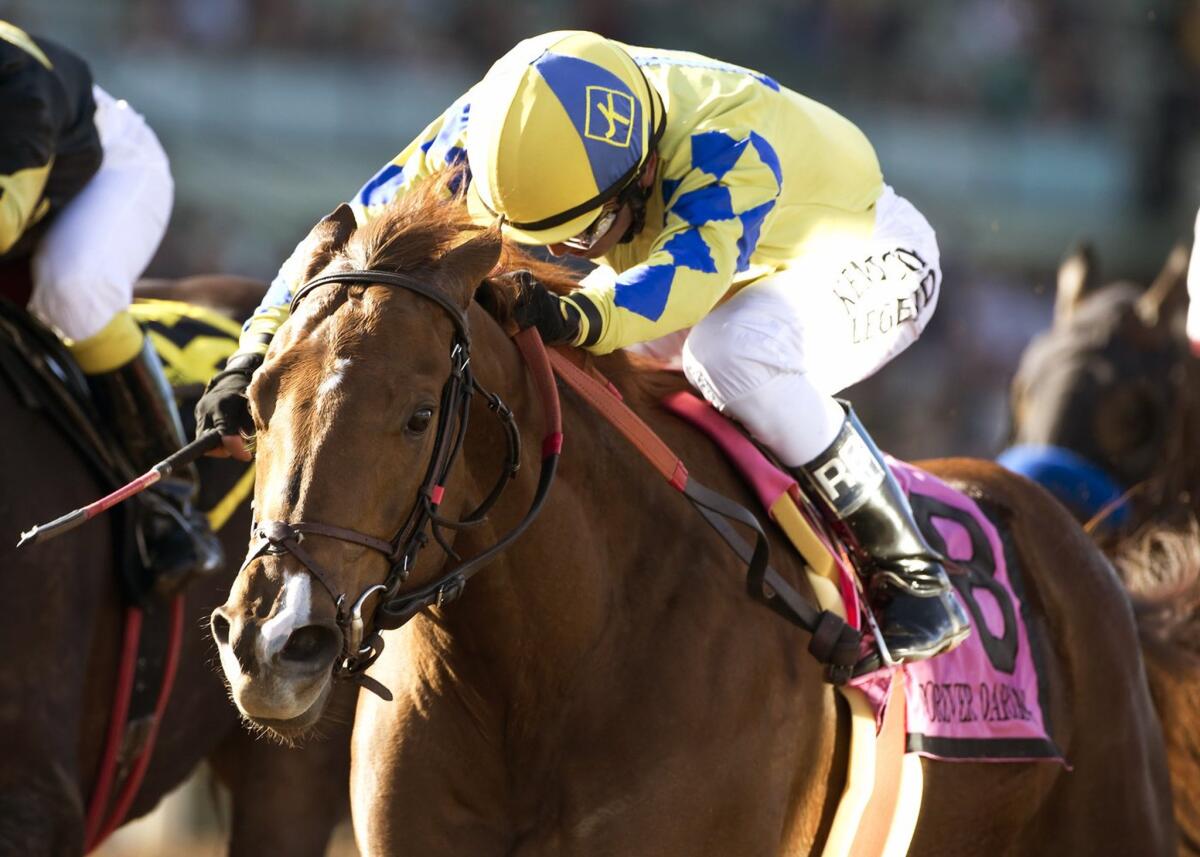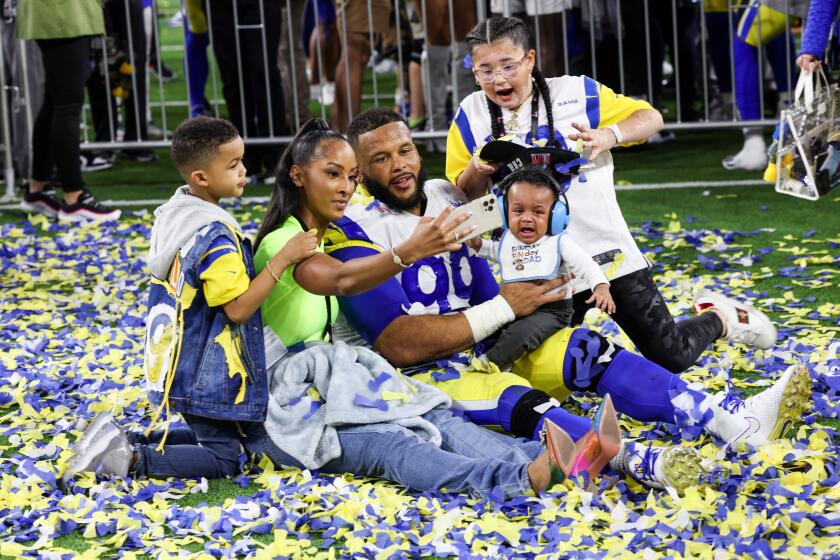Winning consistently is part of the routine for jockey Rafael Bejarano

Forever Darling, with Rafael Bejarano aboard, wins the $200,000 Grade II Santa Ynez Stakes horse race on Jan. 2 at Santa Anita Park.
The leading rider at Santa Anita likes his routine.
Every night before he races, Rafael Bejarano gets into his pajamas and plants himself in the middle of his large gray couch. Ginger, his 5-year-old Pomeranian, settles down to his left and Maya, a 4-year-old rescue Yorki, sits on top of the couch to his right.
And for the next two plus hours he studies the next day’s Racing Form. Anything for an edge. The next morning he goes to the jockey room and watches video of all the races his mounts have run.
Bejarano’s craving for order is in stark contrast to his roller coaster rise as a jockey. In arguably the best jockey colony in the world, Bejarano, 33, has won 24 riding titles in Southern California and is currently leading at Santa Anita’s winter meet, looking for his seventh title there.
“Horses just like to run for him,” veteran trainer Jerry Hollendorfer said. “There are just certain riders that horses like to run for. Bill Shoemaker was like that and so was Russell Baze.”
Hall of fame jockey Mike Smith says Bejarano understands the horses that he rides: “He lets a horse get a chance to find his rhythm. He makes the right decisions. He’s patient and he thinks before he reacts.”
It’s an amazing thing for a young man whose contact with animals was raising guinea pigs for food and who never even saw a horse race until he was 17.
Bejarano, joined by his father Luis Alberto, had made the 630-mile trip from Arequipa, in southern Peru, to Lima, the country’s capital. Bejarano was getting ready to go to college to become a nurse.
Father and son come upon a giant stadium that they thought was used for soccer matches. Once inside they found it to be a racetrack. “When you see something new,” Bejarano recalled, “you don’t know what it’s about. Is it going to be competition or jumping?”
Sometime that day, Bejarano’s world flipped and he decided to try being a jockey. He had three weeks before school started and tried to enroll in the jockey school at the track but the class was already filled at 50. Still, he was allowed to come every day and audit just in case someone dropped out. “It’s my last day and one of the students got into a problem with drugs,” he said, “so now they let me in.”
Problem was he needed a helmet, boots, a whip and other jockey equipment. That’s when trainer Dante Zalle became his benefactor. In exchange for Bejarano’s taking care of some of his horses, Zalle bought him everything he needed.
Bejarano tried to go to both nursing and jockey school at the same time but it was too difficult and he quit nursing after two months.
Two years later, Bejarano was ready for his first race. Only thing is, he still hadn’t told his mother, Elva Martinez, that he was a jockey. Zalle agreed to buy her a plane ticket and it wasn’t until she got to Lima that she learned the truth.
“The first time she saw me with a horse was when I bring her to a racetrack,” Bejarano said. “I said, ‘Mom, I’m a jockey.’ She said, ‘What is that?’ She didn’t have any clue what that meant. She was so scared but I lied to her and said, ‘When you fall off, it’s like if you fall on to a bed.’ ”
Of course, Bejarano won his first race on a horse he’d cared for in Zalle’s barn.
In two months, Bejarano won 49 races. After winning 52 in Peru you are no longer an apprentice, so he was kept off horses for the last week in anticipation of going to the U.S. to race. In the U.S. you are no longer an apprentice 10 months after your fifth win.
After arriving in Kentucky with Zalle’s son, also a trainer, he was told that when he won three more races he would no longer be an apprentice. In other words, they were enacting the Peruvian rules in Kentucky.
Other states didn’t see it that way so Bejarano was able to ride as an apprentice in Ohio, Florida, New York, Virginia and Indiana. It was there that he started to make the trainer contacts that would start to build his business for when he returned to Kentucky.
Along the way Bejarano had struck up a friendship with legendary Peruvian jockey Edgar Prado, who established himself as a top rider in the U.S. “We became friends in America,” Prado said. “I talked to him and told him how things worked here. How to find an agent and those kind of things.”
Finally Bejarano returned to Turfway Park in Kentucky with a lot of experience and won the riding title in his second meeting.
This is when the late trainer Bobby Frankel entered Bejarano’s life. Frankel had asked Prado to ride for him in the winter meeting in New York, but Prado was committed to ride in Florida.
“Frankel asked me who would be a good rider,” Prado said. “I said, ‘Why not Rafael Bejarano, he’s a good jockey and he’s winning races.’ ”
Bejarano’s relationship with Frankel eventually brought him to Southern California. “My idea was to try it for one year,” Bejarano said.
Bejarano wasn’t greeted warmly when he arrived in Southern California. “All the riders are going to protect their business and not give you a shot,” Bejarano said. “It’s everywhere, here, New York, Kentucky.”
He singled out Smith, Gary Stevens and Alex Solis as the exceptions, all willing to help the new kid. “I like helping people that have that much passion,” Smith said. “He was already a very talented rider. Great guy. Great person.”
Bejarano has settled in. He has home near the Rose Bowl where he lives with his two dogs. His mother comes every year and stays for four or five months.
“One day we go to the pet store and we see guinea pigs and my mom thinks we are going to buy them to cook and eat,” Bejarano said. “I say, ‘Mom, we can’t eat guinea pigs here or we go to jail.’”
Bejarano has built a nice business without being tied to any one trainer. “I prefer to ride for everybody,” he said. “That way if one trainer fires you, you still have five, six, seven trainers that still use you.”
Despite all his success, Bejarano has one thing missing from his resume: a win in a Triple Crown race.
“It just seems like things haven’t fallen into place,” said his agent, Tora Yamaguchi. “It’s in the back of my mind. At the start of the year, you need 2-year-olds to keep your business going.”
So far, Bejarano doesn’t have a Derby horse but it’s hard to imagine if there is problem with another jockey that he wouldn’t be first on the list to pick up a mount.
“He needs to be more of a politician,” Prado said. “He needs to be more aggressive about getting better horses. But he’s just a nice quiet guy and we can’t change his personality.”
Or his routines.
More to Read
Go beyond the scoreboard
Get the latest on L.A.'s teams in the daily Sports Report newsletter.
You may occasionally receive promotional content from the Los Angeles Times.











